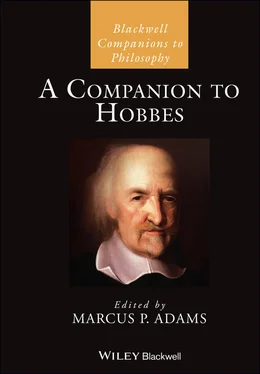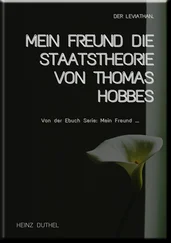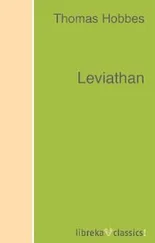11 11 For an illuminating discussion of Hobbes’s presentism, which emphasizes different issues than the present discussion, see Medina (1997).
12 12 See also De corpore XV (OL I.176; EW I.204).
13 13 See also De corpore XXV (OL I.318; EW I.391). Memory allows animate beings to compare fleeting successive sensations: “sense … has necessarily some memory adhering to it, by which former and later phantasms may be compared together and distinguished from one another” (OL I.321; EW I.393).
14 14 For more on the reality of Hobbesian time, see Gorham (2014b).
15 15 For a detailed, recent discussion of the Stoic incorporeals, especially void and time, see Tzamalikos (1991).
16 16 Leijenhorst (2002, ch.3); Slowik (2014).
17 17 Though see Brandt (1917), Spragens (1973), and Leijenhorst (1996).
18 18 Leijenhorst (1996, 430) notes some Aristotelian features of Hobbes’ conception of causality in early works like the Short Tract, but acknowledges that in his mature natural philosophy Hobbes affects a “radical breach” with Aristotle.
19 19 “Affirmat quidem Deus esse Corpus” (2012, 1228; OL III.561).
20 20 Hobbes seems to embrace corporeal God in at least two other places: An Historical Narration Concerning Heresy (EW IV.398) and Considerations Upon the Reputation, Loyalty, Manners and Religion of Thomas Hobbes (EW IV.427). Also in the much earlier (1641) letter to Mersenne, Descartes dismisses Hobbes’s mention (in a lost letter to Descartes) of “the corporeal soul and God” (anima & Deo corporeis) (AT 3.287).
21 21 Curley (1992), Jesseph (2002), and Martinich (1992).
22 22 Fortunately, a number of authors have very recently presented detailed discussions of the corporeal God doctrine; but they do not investigate in much detail its likely sources. See Lupoli (1999), Leijenhorst (2004), Weber (2009), and Springborg (2012).
23 23 See also Alexander of Aphrodisias’ similar complaint against the Stoics for “claiming the existence of two universal principles, matter and God,” which are mixed yet unequal (On Mixture XI, 224–5, T 1976, 139; LS 1987, 273, 275).
24 24 See also Diogenes Laertius, Lives of the Philosophers 7, 150; 1997, 137; Sextus Empiricus, Against the Professors 9, 75–6, LS 1987, 269; Plutarch, On Stoic Self-Contradictions, 1053f; LS 1987, 284.
25 25 See also Leviathan XXXIV (2012, 612; 1651, 303). The editor of this volume has rightly observed that in passages of Leviathan in which Hobbes equates spirit and breath or pneuma, he is mainly dealing with the Christian (not necessarily Stoic) sources of this doctrine. Hobbes’s appeal to the doctrine in the Answer to Bramhall, however, is revealing since it comes just before his detailed defense of the corporeal god. So it is ironic that the Cambridge Platonist Ralph Cudworth, in his vehemently anti-Hobbesian tome, The True Intellectual System of the Universe (1678), diagnoses atheists as suffering from “pneumatophobia”: “an irrational but desperate abhorrence from spirits or incorporeal substances” (1845, Vol. I, 200).
26 26 For discussion see Sambursky (2014, ch. 3), Todd (1978), and especially Sorabji (1988, chs. 5–7).
27 27 For further discussion of the parallels between the Stoic and Hobbesian physico-theologies, see Gorham (2014a). See Gorham (2013) for more on the role of corporeal God in Hobbesian physics.
1 Aristotle. 1971. Complete Works of Aristotle, 2 vols., edited by Jonathan Barnes. Princeton: Princeton University Press.
2 Barker, Peterand Bernard R. Goldstein. 1984. “Is Seventeenth Century Physics Indebted to the Stoics?” Centaurus 27: 148–64.
3 Bramhall, John. 1842–1844. Works of John Bramhall, 4 vols. Oxford: John Henry Parker.
4 Brandt, Frithiof. 1917. Thomas Hobbes’ Mechanical Conception of Nature. Copenhagen: Levin & Munksgaard.
5 Brooke, Christopher. 2012. Philosophic Pride: Stoicism and Political Thought from Lipsius to Rousseau. Princeton: Princeton University Press.
6 Cavendish, Margaret Lucas, Lady. 1664. Philosophical Letters. London: n.p.
7 Cavendish, Margaret Lucas, Lady. 2001. Observations upon Experimental Philosophy, edited by Eileen O’Neill. Cambridge: Cambridge University Press.
8 Clucas, Stephen. 1994. “Atomism of the Cavendish Circle: A Reappraisal.” The Seventeenth Century 9: 247–73.
9 Cudworth, Ralph. 1845. True Intellectual System of the Universe, 3 vols. London: Thomas Tegg.
10 Curley, Edwin. 1992. “‘I Durst Not Write So Boldly’ or How to Read Hobbes’ Theological-Political Treatise.” In Hobbes e Spinoza, edited by Daniela Bostrengi, 497–593. Naples: Bibliopolis
11 Detlefson, Karen. 2006. “Atomism, Monism, and Causation in the Natural Philosophy of Margaret Cavendish.” In Oxford Studies in Early Modern Philosophy, Vol. 3, edited by Daniel Garberand Steven Nadler, 199–240. Oxford: Oxford University Press.
12 Evans, Ernest1948. Adversus Praxean Liber. London: S.P.C.K.
13 Gorham, Geoffrey. 2013. “The Theological Foundations of Hobbesian Physics: A Defense of Corporeal God.” British Journal for the History of Philosophy 21: 240–61.
14 Gorham, Geoffrey. 2014a. “Mixing Bodily Fluids: Hobbes’s Stoic God.” Sophia: International Journal for the Philosophy of Religion 53: 33–49.
15 Gorham, Geoffrey. 2014b. “Hobbes on the Reality of Time.” Hobbes Studies 27: 80–103.
16 Herbert, Gary B.1977. “Hobbes’s Phenomenology of Space.” Journal of the History of Ideas 48: 709–17.
17 Hobbes, Thomas. 1839–1845a. The English Works of Thomas Hobbes, 11 vols., edited by Sir William Molesworth. London: John Bohn. Cited as EW.
18 Hobbes, Thomas. 1839–1845b. Thomæ Hobbes malmesburiensis opera philosophica, 5 vols., edited by Gulielmi Molesworth. London: John Bohn. Cited as OL.
19 Hobbes, Thomas. 1976. Thomas White’s De Mundo Examined, edited by Harold W. Jones. London: Bradford University Press.
20 Hobbes, Thomas. 2012. Leviathan, 3 vols., edited by Noel Malcolm. Oxford: Clarendon Press. [First published 1651].
21 James, Susan. 1999. “The Innovations of Margaret Cavendish.” British Journal for the History of Philosophy 7: 219–44.
22 Jesseph, Douglas. 2002. “Hobbes’s Atheism.” Midwest Studies in Philosophy edited by P. A. French and H. K. Weinstein, 26: 140–66.
23 Laertius, Diogenes. 1997. In Hellenistic Philosophy: Introductory Readings, 2nd ed., edited by Brad Inwoodand Lloyd P. Gerson. Indianapolis: Hackett Publishing.
24 Lagrée, Jacqueline. 1994. Juste Lipse et La Restauration to Stoïcisme. Paris: Vrin.
25 Leijenhorst, Cees. 1996. “Hobbes Theory of Causality and It’s Aristotelian Background.” The Monist 79 (1996): 426–47.
26 Leijenhorst, Cees. 2002. The Mechanisation of Aristotelianism: The Late Aristotelian Setting of Thomas Hobbes’ Natural Philosophy. Leiden: Brill.
27 Leijenhorst, Cees. 2004. “Hobbes’s Corporeal Deity.” Revista di storia della filosofia 59 (1): 73–95.
28 Lipsius, Justus. 1604. Physiologiae Stoicurm libre tres. Antwerp: J. Moretus.
29 Long, Anthony A. 2003. “Stoicism in the Philosophical Tradition: Spinoza, Lipsius, Butler.” In The Cambridge Companion to the Stoics, edited by Brad Inwood, 365–92. Cambridge: Cambridge University Press.
30 Long, Anthony A.and David N. Sedley, eds. 1987. The Hellenistic Philosophers, Vol. 1: Translation of the Principles Sources with Philosophical Commentary. Cambridge: Cambridge University Press. Cited by LS and page number.
31 Lupoli, Agostino. 1999. “Fluidismo e Corporeal Deity nella filosofia naturale di Thomas Hobbes.” Revista di storia della filosofia 54 (4): 573–609.
32 Martinich, Aloysius P.1992. The Two Gods of Leviathan: Thomas Hobbes on Religion and Politics. Cambridge: Cambridge University Press.
Читать дальше












